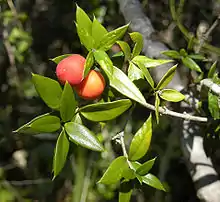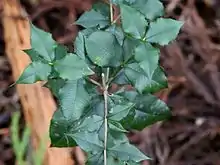Alyxia ruscifolia
Alyxia ruscifolia, commonly known as the chainfruit or prickly alyxia, is a shrub of high rainfall areas in eastern Australia. The natural range of distribution is from Wollongong in New South Wales to the Wet Tropics and further north to New Guinea.
| Alyxia ruscifolia | |
|---|---|
 | |
| Alyxia ruscifolia | |
 | |
| Form with spiky edged leaves Mount Banda Banda | |
| Scientific classification | |
| Kingdom: | Plantae |
| Clade: | Tracheophytes |
| Clade: | Angiosperms |
| Clade: | Eudicots |
| Clade: | Asterids |
| Order: | Gentianales |
| Family: | Apocynaceae |
| Genus: | Alyxia |
| Species: | A. ruscifolia |
| Binomial name | |
| Alyxia ruscifolia | |
It can be seen in a variety of different situations. Such as the sub tropical Lord Howe Island, surrounded by the ocean, or the tropical rainforest understorey at Kuranda in Queensland. Or the exposed rocky cliffs on the Mount Royal Range in New South Wales, where it is subject to high winds and snow. The habitat is many types of rainforests from sea level to 1200 metres, sometimes also seen in sclerophyll forests.
Description
Usually around two metres tall, sometimes larger. Leaves in whorls, narrow lanceolate to broad lanceolate in shape, 1 to 6 cm long. Thick, leathery and glossy with a pointed tip. Leaves usually not toothed, lateral veins obvious. The leaf stem is between 1 and 4 mm long.
Fragrant white flowers form in spring and summer, in terminal heads of 3 to 5 flowers. The fruit is orange to red in colour, 8 to 11 mm in diameter.
References
http://plantnet.rbgsyd.nsw.gov.au/cgi-bin/NSWfl.pl?page=nswfl&lvl=sp&name=Alyxia~ruscifolia 9 June 2009